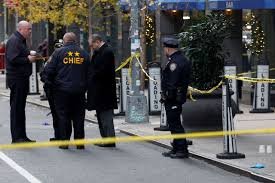I found myself this morning reading a NYT article on the vast man-hunt for the murderer of United Healthcare CEO Brian Thompson. The article contained a fascinating recounting of the police's painstaking search through thousands of hours of video footage from the city's network of 60,000 cameras. Meticulous scouring of these videos allowed the police to piece together a detailed account of the suspect's movements during the days preceding the murder, as well as his flight from the scene of the crime and -- apparently -- from the city itself.
While reading the article, I encountered the phrase, "... there were hundreds of detectives working on every aspect of the case..." Now, murder is always tragic and may indeed be the most heinous of crimes. It should receive the highest priority from law enforcement. But NYC averages slightly more than one murder every day. How many of those unsolved cases, I wonder, are benefitting from the work of hundreds of detectives? And if – as I suspect – the answer to that question is zero, I wonder why this one is different.
Actually, that's not true. I know exactly why this one is different: Brian Thompson is a rich, prominent, white man at the apex of our social hierarchy, not some unnamed person of color killed in a random urban assault. Now, I certainly understand that a cold-blooded murder committed in broad daylight in the center of downtown Manhattan requires a robust investigation. I am less persuaded, however, that it should dominate the work of the entire police department while dozens (hundreds?) of other murders languish in obscurity
There are certainly reasons to pay attention to this case. The issues surrounding it are significant: anger at the injustices in -- and venality of -- our current health care system has national implications, as do the ubiquitousness of guns, and our generalized anxiety about crime. For all these reasons, this murder might be the focus for heightened media attention, but not for a heightened effort by law enforcement (recognizing that the two are always, to some degree, related). But the reasons for the heightened police efforts are just as obvious: systemic inequities around race, class, and gender.
Over the past year, as election rhetoric steadily escalated, our nation saw a continual assault on decades of work toward greater racial equity, with long-standing civil rights remedies being cast out by the Supreme Court, and Diversity, Equity, and Inclusion efforts in corporate America and academia being challenged. While understanding that progress on social issues always has a pendulum-like quality to it over time, this assault on civil rights efforts is unprecedented in modern decades. The anger against DEI efforts has a vitriolic quality that defies reason. To merely utter the words "systemic racism" is to invite furious recriminations. And yet, the message of this investigation of Brian Thompson could not be more clear: if you are a rich, white, male, your life is of infinite value. If you are not, maybe not so much.










